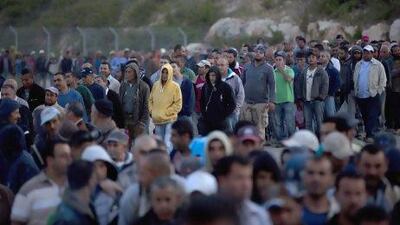RAMALLAH // Palestinian officials said yesterday that billions of dollars in aid proposed by the US secretary of state was no substitute for negotiations and a political solution to the Palestinian-Israeli conflict.
"The Palestinian leadership will not offer political concessions in exchange for economic benefits," said Mohammad Mustafa, the president of the Palestine Investment Fund and an economic adviser to Mahmoud Abbas, the Palestinian Authority (PA) president.
Some Palestinians welcomed the US$4 billion (Dh14.7bn) initiative announced by John Kerry on Sunday at a World Economic Forum (WEF) gathering in Jordan. The plan, to be funded by unspecified private donors, could dramatically reduce Palestinian unemployment, stimulate their struggling industries and offer incentives for restarting peace negotiations with Israel, Mr Kerry said.
"If anybody understands the situation, it's Mr Kerry," said Munib Al Masri, a prominent Palestinian businessman.
Mr Kerry also received backing for his plan from a group of 300 Palestinian and Israeli businessmen who have formed an independent initiative called "Breaking the Impasse" that seeks to find ways to restart negotiations on a two-state solution.
Mr Al Masri, who is involved in the initiative, said the proposal should be looked at in a "positive" light. Still, like most Palestinians, he stressed that any such development plan would not be effective without addressing settlements and other pressing issues, such as Palestinians prisoners in Israeli jails.
An official in the Palestine Liberation Organisation (PLO) said Mr Kerry's proposal lacked any semblance of pressure on Israel to end its 46-year occupation of the West Bank, Gaza Strip and East Jerusalem, territories wanted for a Palestinian state.
"It's nice that Kerry is making this gesture, but it doesn't deal with the core issues," said the official. "This is not an alternative to resolving the political issues we face."
A critical issue is Israel's construction of Jewish settlements, which Mr Abbas, who also heads the PLO, demands must stop before returning to peace talks.
The Palestinian leader showed no sign of budging on that demand during his speech at the WEF on Sunday. He warned of fading hope for building a Palestinian state, citing as a major obstacle the 500,000 settlers who live in East Jerusalem and the West Bank.
"The new generation is losing confidence in the idea of the coexistence of two states," Mr Abbas said, warning that settlement expansion "will close the window for the two-state solution".
Mr Kerry has not disclosed details of how his economic plan would be funded or implemented. But he indicated during his speech that Palestinian economic development could not be achieved without a breakthrough in the peace process.
The US leader has visited the region four times this year to cajole Israelis and Palestinians back to the negotiating table. Their last round of peace talks, in 2010, collapsed because Israel refused to halt settlement construction.
Still, Mr Kerry emphasised the possibility of "stunning" results with his economic initiative, which would be backed by a team of corporate executives, well known investors and business analysts.
The US secretary of state predicted a tripling of Palestinian tourism and agricultural production, a 50 per cent rise in gross domestic product over the next three years, as well as a two-thirds reduction in unemployment under his plan.
Unemployment in the Palestinian territories reached nearly 24 per cent in 2010, according to the United Nations.
Mr Kerry's development effort is being coordinated by Britain's former prime minister Tony Blair, who is the representative of the Middle East Quartet. Comprised of the United States, European Union, Russia and United Nations, the group seeks to facilitate a negotiated end to the Israeli-Palestinian conflict.
Officials in Mr Blair's office could not be reached for comment.
International aid organisations routinely warn that Israel's occupation prevents the emergence of a self-sustaining Palestinian economy. Israel controls their resources and borders and restricts their movement and trade with an array checkpoints and bureaucratic obstacles.
A PA official said Mr Kerry's economic plan risked being seen as a fig leaf for Israel's occupation if Washington did not pressure Israel to halt settlement construction or present a map of proposed borders of a Palestinian state to facilitate restarting negotiations.
Benjamin Netanyahu, Israel's prime minister, has repeatedly refused both ideas, Palestinian officials say.
"The Americans are doing what they do best - they're ignoring the real problem," said the official. "If you don't roll back the occupation, this is all one big waste of time."
For Saied Tammari, 28, a tour guide in Bethlehem, more international money is not the solution to his problems.
The bulk of the PA's budget of $3.9 billion for 2012 relies heavily on foreign donations, including about $500 million a year from the United States.
"If there was freedom for Palestinians here, if we didn't' have checkpoints and all the restrictions that prevent us from living like normal human beings, then we wouldn't need all this foreign money," he said.
Like many West Bank Palestinians, Mr Tammari is forbidden by Israel to enter Jerusalem, where he wants to lead tours and meet prospective clients. He estimates he would earn about double his monthly income of $1,500 if he could access the city, allowing him to move out of his parents' home.
"If I had that money, I would build my own house, marry a woman and then I could plan my future," he said.
hnaylor@thenational.ae
*Additional reporting by Agence France-Presse
twitter: For breaking news from the Gulf, the Middle East and around the globe follow The National World. Follow us

Palestinian Authority says US aid is 'no substitute for negotiations'
Palestinian officials say billions of dollars in aid proposed by the US secretary of state are no substitute for negotiations and a political solution to the Palestinian-Israeli conflict. Hugh Naylor reports from Ramallah
Most popular today
